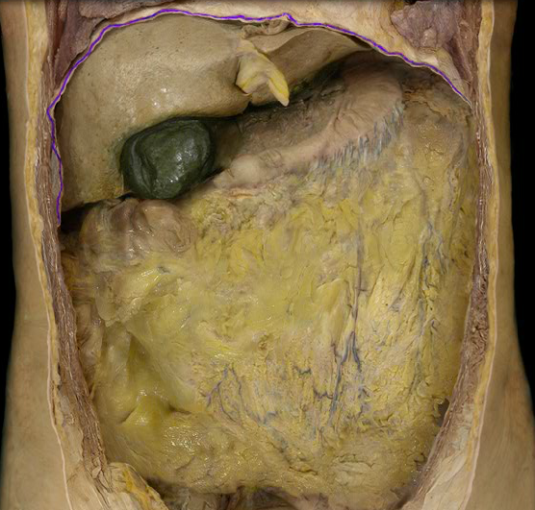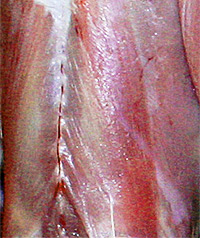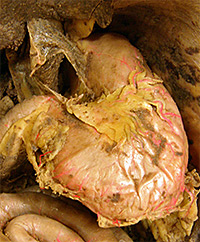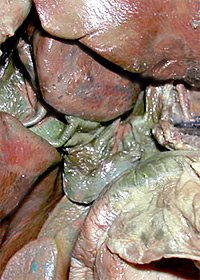ဘိကၡေဝ-ရဟန္းတို႔။ ဧဝေမဝေခါ-ဤအတူလွ်င္။ ဘိကၡဳ-ရဟန္းသည္။ ပ။ ဣမေမဝ ကာယံ-ဤ႐ူပကာယ ခႏၶာကိုယ္ကိုသာလွ်င္။ ပစၥေဝကၡတိ-ဆင္ျခင္၏။
ဣမသႎၼ ကာေယ-ဤတစ္လံမွ်ေလာက္ေသာ ႐ူပကာယ ခႏၶာကိုယ္၌ –
(၁) ေကသာ – ႏွစ္ကုေဋ ငါးသန္းေသာ ဆံတို႔လည္းေကာင္း။
(၂) ေလာမာ – ကိုးသိန္းကိုးေသာင္းေသာ အေမြးတို႔လည္းေကာင္း။
(၃) နခါ – ငါးၾကင္းေၾကးသဖြယ္ ႏွစ္ဆယ္ေသာ လက္သည္း ေျခသည္းတို႔လည္းေကာင္း။
(၄) ဒႏၲာ – သံုးဆယ့္ႏွစ္ေခ်ာင္းေသာ သြားတို႔လည္းေကာင္း။
(၅) တေစာ – တစ္ကိုယ္လံုးကို ခြာ၍ လံုးသည္ရွိေသာ္ ဆီးေစ့ခန္႔မွ်ရွိေသာ အထူးထူးေသာ အဆင္းရွိေသာ ပါးေသာ အေပၚေရ၊ အဆင္းျဖဴေသာ ထူေသာ အတြင္းေရလည္းေကာင္း။
(၆) မံသံ – တိုက္နံရံကို လိမ္းက်ံေသာ ေျမစိုင္ကဲ့သို႔ အ႐ိုးကို လိမ္းက်ံေသာ ကိုးရာေသာ အသားလည္းေကာင္း။
(၇) ႏွာ႐ု – နံရံကို ဖြဲ႕ေသာ ႀကိမ္ႏြယ္ကဲ့သို႔ အ႐ိုးကိုဖြဲ႕ေသာ ကိုးရာေသာ အေၾကာ၊ အရသာကို ေဆာင္ေသာ ခုနစ္ေထာင္ေသာ အေၾကာလည္းေကာင္း။
(၈) အ႒ိ – သံုးရာေသာ အ႐ိုးလည္းေကာင္း။


(၉) အ႒ိမိၪၨံ – က်က္စြာေပါင္း၍ ဝါးက်ည္၌ ထည့္အပ္ေသာ ႀကိမ္ၫြန္႔ႏွင့္ သ႑ာန္တူေသာ ျဖဴေသာ အဆင္းရွိေသာ ႐ိုးတြင္းျခင္ဆီလည္းေကာင္း။
(၁၀) ဝကၠံ – ေရမ်ိဳမွ ဆက္ေသာ အေၾကာ၏အဆံုး ႏွလံုးသားကို ျခံရံ၍ တည္လ်က္ သရက္သီးပြတ္ႏွင့္ သ႑ာန္တူေသာ စဥ္းငယ္နီေသာ အဆင္းရွိေသာ အသားစိုင္ႏွစ္ခုဟု ဆိုအပ္ေသာ အညိႇဳ႕လည္းေကာင္း။

(၁၁) ဟဒယံ – သားျမတ္ႏွစ္ခုအလယ္၊ ကိုယ္အတြင္း ရင္အခ်ိဳင့္ အညိႇဳ႕ႏွစ္ခုအၾကား၌ တြဲလ်ား ဦးေစာက္တည္ေသာ ပညာရွိအား စဥ္းငယ္ပြင့္ေသာ၊ ပညာမဲ့အား ငံုေသာ၊ အေပၚဖတ္ကို ခြာ၍ ပစ္အပ္ေသာ ပဒုမၼာၾကာငံုတမွ် အပကား ေျပျပစ္သန္႔ရွင္း၊ အတြင္းကား သပြတ္ခါးအူသဖြယ္ အလယ္၌ ပုန္းညက္ေစ့ဆန္ေလာက္ေသာ တြင္း၌။
“စ႐ိုက္ႏွင့္အညီ၊ နီျမန္း-ရာဂ၊ ေဒါသ-မည္းျငား၊ သားေဆးရည္-ေမာဟ၊ တကၠ-ပဲျပဳတ္ရည္၊ ဝါသည္-သဒၶါ၊ ပညာ-ၿပိဳးျပက္၊ ေဇာတမ်က္သြင္၊ အေရာင္ထင္ေသာ” မေနာဓာတ္, မေနာဝိညာဏဓာတ္, စိတ္, ေစတသိက္တို႔၏ မွီရာ ဟဒယဝတၳဳ႐ုပ္တည္းဟူေသာ တလက္ဖက္မွ်ေလာက္ေသာ ႏွလံုးေသြးရွိေသာ ႏွလံုးသားလည္းေကာင္း။

(၁၂) ယကနံ – သားျမတ္ႏွစ္ခုတို႔၏ အလယ္၌ လက္ယာနံပါးကို မွီလ်က္ ကသစ္႐ြက္ႏွင့္ သ႑ာန္တူေသာ ေဖ်ာ့ေတာ့ေတာ့ နီေသာ အဆင္းရွိေသာ ပညာရွိအား ငယ္သည္ျဖစ္၍ ႏွစ္ခု သံုးခု၊ ပညာမဲ့အား ႀကီးသည္ျဖစ္၍ တစ္ခုတည္းေသာ အသည္းလည္းေကာင္း။
(၁၃) ကိေလာမကံ – ျဖဴေသာအဆင္းရွိေသာ အသားတရစ္ကို ရစ္ေသာ အဝတ္ကဲ့သို႔ အညႇိဳ႕, ႏွလံုးကို ဖံုး၍ တည္ေသာ အေျမႇး၊ ကိုယ္အလံုး၌ အေရ၏ ေအာက္မွ တည္ေသာ အေျမႇးအားျဖင့္ ႏွစ္ပါးေသာ အေျမႇးလည္းေကာင္း။

(၁၄) ပိဟကံ – ႏွလံုးသား၏ လက္ဝဲနံပါး၌ မွီလ်က္ လက္ခုနစ္သစ္ခန္႔မွ် ႏြားလွ်ာဖ်ားသ႑ာန္ ညိဳေသာ အဆင္းရွိေသာ ဝမ္းေလွ်ာ သရက္႐ြက္ဟု ဆိုအပ္ေသာ အသားဖ်ဥ္းလည္းေကာင္း။

(၁၅) ပပၹါသံ – အညိႇဳ႕, ႏွလံုးကို ဖံုး၍ တည္လ်က္ မုန္႔ယွက္ျပတ္သ႑ာန္ နီေသာအဆင္းရွိေသာ သံုးဆယ့္ႏွစ္ခုေသာ အသားလႊာတည္းဟူေသာ ကလအုန္းေဆာင္းထပ္ဟု ဆိုအပ္ေသာ အဆုတ္လည္းေကာင္း။

(၁၆) အႏၲံ – ေသြးျပည့္ေသာ က်င္း၌ အေရကို ဆုတ္၍ ထည့္အပ္ေသာ ေႁမြေခြကဲ့သို႔ လည္ေခ်ာင္းမွ ဝစၥမဂ္တိုင္ေအာင္ ကိုယ္တြင္း၌ တည္ေသာ ေယာက်္ားအား သံုးဆယ့္ႏွစ္ေတာင္၊ မိန္းမအား ႏွစ္ဆယ့္ရွစ္ေတာင္ရွိေသာ ႏွစ္ဆယ့္တစ္ပတ္ ေခြ၍ေနေသာ ျဖဴေသာအဆင္းရွိေသာ အူမလည္းေကာင္း။
(၁၇) အႏၲဂုဏံ – ေျခသုတ္ႀကိဳးဝန္းကို ဖြဲ႕ေသာ ႀကိဳးေသးကဲ့သို႔ ႏွစ္ဆယ့္တစ္ပတ္ေခြရာ၌ အူမကို ဖြဲ႕ေသာ ေမွာ္ျမစ္အတူ ျဖဴေသာ အူသိမ္လည္းေကာင္း။
(၁၈) ဥဒရိယံ – အစြန္းႏွစ္ဘက္၌ ကိုင္၍ ညႇစ္အပ္ေသာ စိုေသာ ပုဆိုး၏ အလယ္အဖုကဲ့သို႔ ႏွစ္ဆယ့္တစ္ပတ္ေခြေသာ အူမ၏ အလယ္အဖုဟု ဆိုအပ္ေသာ သံုးဆယ့္ႏွစ္ပါးေသာ ပိုးမ်ိဳးတို႔၏ ေနရာ အစာသစ္အိမ္၌ တည္ေသာ ေခြးစားက်င္း၌ ေခြးအန္ဖတ္ကဲ့သို႔ မ်ိဳအပ္ေသာ အစာသစ္လည္းေကာင္း။
(၁၉) ကရီသံ – က်ည္ေထာက္၌ ထည့္အပ္ေသာ ေျမညက္ကဲ့သို႔ အူမ၏အဆံုး အေစာက္ရွစ္သစ္ခန္႔မွ် ရွိေသာ အစာေဟာင္းအိမ္၌ တည္ေသာ အစာသစ္မွ က်က္၍ က်ေသာ အစာေဟာင္းတည္းဟူေသာ က်င္ႀကီးလည္းေကာင္း။
(၂၀) မတၳလုဂႍ – ဗူးအံု၌ ထည့္အပ္ေသာ မုန္႔ညက္စိုင္သ႑ာန္ ေခါင္းခြံတြင္း၌ ခ်ဳပ္ေၾကာင္းေလးခုကို မွီ၍ တည္ေသာ မုန္႔ညက္စိုင္အတူ ျဖဴေသာ ဦးေႏွာက္လည္းေကာင္း။
(၂၁) ပိတၱံ – ေရျပည့္ေသာ သပြတ္ခါးသီးသ႑ာန္ ႏွလံုးအဆုတ္တို႔၏ အလယ္ အသည္းကို မွီ၍ တည္ေသာ ေနာက္က်ဳေသာ သစ္မည္စည္ဆီႏွင့္တူေသာ အအိမ္ျဖင့္ ဖြဲ႕အပ္ေသာ ဗဒၶသည္းေျခ, ဆံ, အေမြး, ေျခသည္းလက္သည္း, သြားတို႔၏ အသားမွ လြတ္ရာ အရပ္ေျခာက္ထပ္ ၾကမ္းတမ္းေသာ အရာကို ထားလ်က္ မုန္႔ယွက္၌ ဆီကဲ့သို႔ တစ္ကိုယ္လံုး ႏွံ႔၍ တည္ေသာ ၫိႈးႏြမ္းေသာ ပန္းအဆင္းရွိေသာ အအိမ္ျဖင့္ မဖြဲ႕အပ္ေသာ အဗဒၶသည္းေျခအားျဖင့္ ႏွစ္ပါးေသာ သည္းေျခလည္းေကာင္း။
(၂၂) ေသမွံ – မစင္တြင္းကို ပိတ္ေသာ ပ်ဥ္ႀကီး တန္စီးတြင္းအထက္ ေျမႇးယွက္ေသာ အျမႇဳပ္လႊာအသြင္ ေရအျပင္ကို လႊမ္းေသာ ေရညႇိပမာ အစာသစ္ကို ပိတ္လ်က္ အူမ၌တည္ေသာ ျဖဴေသာ အဆင္းရွိေသာ တကြမ္းစားမွ်ေလာက္ေသာ သလိပ္လည္းေကာင္း။
(၂၃) ပုေဗၺာ – အေစးရွိေသာ သစ္ပင္၏ ဓားခုတ္ရာ စသည္၌ စုေဝးေသာ အေစးကဲ့သို႔ အမာေပါက္ရာ, ခလုတ္ထိရာ, ဆူးၿငိရာ, မီးလွ်ံသင့္ရာ စသည္တို႔၌ ေသြးပုပ္ စုေဝး၍ ျဖစ္ေသာ ေဖ်ာ့ေတာ့ေသာ အဆင္းရွိေသာ ျပည္လည္းေကာင္း။
(၂၄) ေလာဟိတံ – ၾကည္လင္ေသာ ခ်ိပ္ရည္အဆင္းကဲ့သို႔ ကိုယ္လံုးအႏွံ႔ အေၾကာကို ေလွ်ာက္၍ ေ႐ြ႕လ်ားေသာ တစ္ျပည္သားမွ်ေလာက္ေသာ ေ႐ြ႕လ်ားေသာ ေသြး၊ ပ်စ္ခၽြဲေသာ ခ်ိတ္ရည္အဆင္းကဲ့သို႔ အသည္းတည္ရာ၏ ေအာက္အဖို႔ကို ျပည့္ေစ၍ ႏွလံုး, အညႇိဳ႕, အဆုတ္အထက္ တစက္စက္ ယိုစီးလ်က္ ႏွလံုး, အညိႇဳ႕, အဆုတ္တို႔ကို စြတ္ေစ၍ တည္ေသာ တကြမ္းစားမွ်ေလာက္ေသာ မေ႐ြ႕လ်ားေသာ ေသြးအားျဖင့္ ႏွစ္ပါးေသာ ေသြးလည္းေကာင္း။
(၂၅) ေသေဒါ – ေရမွ ႏုတ္အပ္ေသာ ၾကာ႐ိုးမွ ယိုစီးေသာ ေရကဲ့သို႔ ကိုယ္စိတ္ပူပန္ေသာအခါ အေမြးတြင္းတို႔မွ ယိုစီးေသာ ဆီၾကည္အဆင္းရွိေသာ အာေပါဓာတ္တည္းဟူေသာ ေခၽြးလည္းေကာင္း။
(၂၆) ေမေဒါ – ဆူသသူအား တစ္ကိုယ္လံုး၊ ၾကံဳသသူအား ျမင္းေခါင္းသား စသည္၌ တည္ေသာ နႏြင္းဆိုးေသာ ပုဆိုးကဲ့သို႔ ဝါေသာ အဆင္းရွိေသာ အဆီခဲလည္းေကာင္း။
(၂၇) အႆု – ငိုေႂကြးျမည္တမ္း ရယ္ပန္းႀကီးေသာအခါ မေလ်ာက္ပတ္ေသာ ဥတုအာဟာရမ်ိဳး၊ မီးခိုး ေျမမႈန္႔ထိပါးေသာအခါ စသည္တို႔၌ မ်က္စိမွ ယိုစီးေသာ ဆီၾကည္အဆင္းရွိေသာ အာေပါဓာတ္တည္းဟူေသာ မ်က္ရည္လည္းေကာင္း။
(၂၈) ဝသာ – ထမင္းခ်ိဳး၌ သြန္းေလာင္းေသာ ဆီကဲ့သို႔ မီးပူေသာအခါ စသည္တို႔၌ မ်ားေသာအားျဖင့္ လက္ဖမိုး, လက္ဖဝါး, ေျခဖမိုး, ေျခဖဝါး, ႏႈတ္သီးဖ်ား, နဖူးျပင္, ပခံုးစြန္း၌ တည္ေသာ အုန္းဆီအဆင္းႏွင့္တူေသာ ဆီၾကည္လည္းေကာင္း။
(၂၉) ေခေဠာ – ခ်ဥ္သီးစသည္ကို ျမင္ေသာအခါ လက္ယက္တြင္းမွ ထြက္ေသာ လက္ယက္ေရကဲ့သို႔ ပါးေစာင္ႏွစ္ဘက္မွ သက္၍ လွ်ာ၌ တည္ေသာ လွ်ာဖ်ား၌ က်ဲေသာ၊ လွ်ာရင္း၌ ခၽြဲေသာ၊ အျမႇဳပ္ႏွင့္ေရာေသာ အာေပါဓာတ္တည္းဟူေသာ တံေတြးလည္းေကာင္း။
(၃၀) သိဃၤာဏိကာ – ငိုေႂကြးျမည္တမ္းျခင္း၊ မေလ်ာက္ပတ္ေသာ ဥတု အာဟာရ၏ အစြမ္းျဖင့္ ဓာတ္ေခ်ာက္ခ်ားျခင္းေၾကာင့္ျဖစ္ေသာ ႏုေသာထန္းသီးဆန္ႏွင့္တူေသာ ဦးေႏွာက္မွ ယိုစီးေသာ အာေပါဓာတ္တည္းဟူေသာ ႏွပ္လည္းေကာင္း။
(၃၁) လသိကာ – ဝင္႐ိုးကို နယ္ဆီသုတ္သကဲ့သို႔ တစ္ရာ့ရွစ္ဆယ္ေသာ အ႐ိုးဆက္တို႔၏ အၾကားဝယ္ နယ္ဆီကိစၥကို ၿပီးေစ၍ တည္ေသာ မဟာေလွကားေစးႏွင့္တူေသာ ပ်စ္ခၽြဲေသာ အေစးလည္းေကာင္း။
(၃၂) မုတၱံ – တန္းတြင္း၌ ေမွာက္ခံုပစ္အပ္ေသာ အဝက်ဥ္းေသာ အိုးတြင္း၌ ဝင္ေသာ တန္စီးေရကဲ့သို႔ စည္ေပါင္းတြင္း၌တည္ေသာ ပဲႀကီးျပာရည္အဆင္းရွိေသာ က်င္ငယ္လည္းေကာင္း။
ဣတိ-ဤသို႔။ ဣေမ ဒြတၱႎသာကာရာ-ဤသံုးဆယ့္ႏွစ္ပါးေသာ အျခင္းအရာအစံုတို႔သည္ –
(က) ဝဏၰေတာပိ – အဆင္းအားျဖင့္လည္းေကာင္း။
(ခ) သဏၭာနေတာပိ – လံုးလံုးေလ်ာင္းေလ်ာင္း ေပါင္း၍ တည္ဟန္ သဏၭာန္အားျဖင့္လည္းေကာင္း။
(ဂ) ဂႏၶေတာပိ – ညႇီနံေညႇာ္ေလာင္း မေကာင္းေသာ ရနံ႔အားျဖင့္လည္းေကာင္း။
(ဃ) အာသယေတာပိ – ျဖစ္ရာအေၾကာင္းအားျဖင့္လည္းေကာင္း။
(င) ၾသကာသေတာပိ – တည္ရာအရပ္အားျဖင့္လည္းေကာင္း။
(စ) အသုစိဘာေဝန – မစင္ၾကယ္သည္၏အျဖစ္ျဖင့္။
(ဆ) ေဇဂုစၧိဘာေဝန – စက္ဆုတ္ဖြယ္၏အျဖစ္ျဖင့္။
(ဇ) ပဋိကူလဘာေဝန – ႐ြံရွာဖြယ္၏အျဖစ္ျဖင့္။
(စ်) ဒုဂၢႏၶဘာေဝန – ညီႇနံေညႇာ္ေလာင္း မေကာင္းေသာ ရနံ႔၏အျဖစ္ျဖင့္။
(ည) အသုဘဘာေဝန – မတင့္တယ္သည္၏အျဖစ္ျဖင့္။
ပညာယမာနာ-ထင္ကုန္လ်က္။
အတၳိ-ရွိကုန္၏။
ဣတိ-ဤသို႔။
ပစၥေဝကၡတိ-ဆင္ျခင္၏။
(ဋ) ဣတိ-ဤသို႔။
အဇၥ်တၱံ ဝါ – မိမိသႏၲာန္၌လည္း။
ကာေယ – ဆံ, အေမြးစေသာ အေပါင္းအစု၌။
ကာယာႏုပႆီ – ဆံ, အေမြး စေသာ အေပါင္းအစုကို အဖန္တလဲလဲ ႐ႈသည္ျဖစ္၍။
ဝိဟရတိ – ေန၏။
ပ။
ဘိကၡေဝ – ရဟန္းတို႔။
ဧဝမၸိေခါ – ဤသို႔လည္း။
ဘိကၡဳ – ရဟန္းသည္။
ကာေယ – ႐ူပကာယ၌။
ကာယာႏုပႆီ – ႐ူပကာယကို အဖန္တလဲလဲ ႐ႈသည္ျဖစ္၍။
ဝိဟရတိ – ေန၏။






























